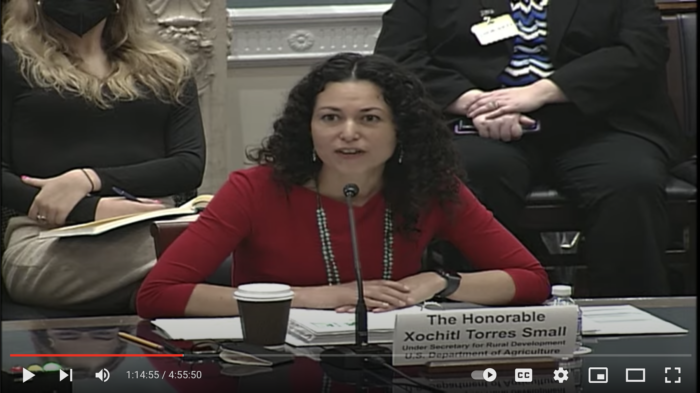
Today, the U.S. House of Representatives Committee on Agriculture held a hearing, “A 2022 Review of the Farm Bill: Energy – Renewable Energy Opportunities in Rural America.”
In his opening remarks, Chairman David Scott (D-GA) discussed the opportunity for renewable energy production to provide new revenue streams for agricultural producers and the economies of their communities. This hearing sought to discuss the implementation of programs in the 2018 Farm Bill and what changes may be useful to rural stakeholders as Congress begins to consider the 2023 Farm Bill.
Ranking Member G.T. Thompson (R-PA) discussed the need for dependability and resilience in rural energy, and “promoting renewable energy in sensible ways so that economic growth and emission reductions complement one another.” Specifically, he included electric loan programs including the Rural Energy Savings Program, for which NCBA CLUSA has strongly advocated.
The first panel once again featured Under Secretary of Rural Development Xochitl Torres Small, who appeared before the Senate Committee two weeks ago where she promoted cooperatives as a tool to strengthen the rural care economy. Today, Torres Small discussed the contribution of electric co-ops in the renewable energy sector. “I’m highlighting rural electric co-ops today, not only because they’re a great partner, but because I think they’re ahead of most of us in the way they think about clean energy.”
Torres Small highlighted a loan to Roanoke Electric Co-op, an NCBA CLUSA member, to help homes they power pay for energy efficiency improvements and electric charging stations. This builds on the co-op’s own pilot program beginning in 2015 and has reached over 650 co-op member-owners where member-owners enjoy an average savings of $600 per year. She closed by celebrating the innovation, hard work and leadership of rural people to create good jobs and increase the security and resiliency of the U.S. energy economy.
Also on the panel was Rural Business-Cooperative Service Administrator Dr. Karama Neal and Rural Utilities Service Acting Administrator Chris McLean. Neal and McLean supplemented Torres Small’s responses including highlighting the Department’s efforts to alleviate stresses in the U.S. food supply chain, including the Meat and Poultry Processing Expansion Program. Dr. Neal discussed the details of this program with NCBA CLUSA members in December 2021.
Congresswoman Abigail Spanberger (D-VA) discussed her legislation to expand the current Rural Energy for America Program to further include farmer cooperatives as eligible entities in the program. REAP was discussed significantly throughout the hearing, as it is widely used but significantly oversubscribed. In recent application cycles, USDA has received requests for funds that nearly double the funding available.
Further, during her testimony, Under Secretary Torres Small discussed the importance of bridging the digital divide. She suggested that agencies and communities leverage the expertise and best practices of rural electric co-ops. Today, more than one hundred electric co-ops deploy broadband to their service areas.
Congressman Bobby Rush (D-IL) raised the important issue of rural energy burdens. As a percent of household income, rural households pay significantly more for monthly energy costs compared to urban counterparts. The disparities are even more sever in elderly, minority, and low-income rural households, where consumer pay, on average, nine percent of household income to cover energy costs. Rush asked the panel how cooperatives are solving these issues and what best practices can be shared with non-rural communities. RBCS Administrator Dr. Karama Neal responded that RBCS is “proud of our heritage supporting cooperatives” and providing investments that empower people to use the cooperative model. Neal discussed not only the Rural Cooperative Development Grant Program and the Socially-Disadvantaged Group Grant, but also noted that RBCS is diligent about including cooperatives as eligible entities in many other programs, such as the Rural Innovation Stronger Economy (RISE) and Rural Community Development Initiative (RCDI) programs.
This hearing also featured a second panel of expert witnesses, one of whom was Bill Cherrier, CEO and Executive Vice President of Central Iowa Power Cooperative, testifying on behalf of the National Rural Electric Cooperative Association (NRECA). Central Iowa Power Cooperative is a generation and transmission cooperative, which provides energy to consumer-owned electric cooperatives that serve home and businesses.
Cherrier highlighted several key themes including incentives to support the transition should be inclusive of all energy providers, including accounting for the not-for-profit status of electric cooperatives through direct pay. Congressman Randy Feenstra (R-IA) later shared his support for direct pay incentives to ensure that the benefits of taking the path of renewable energy reaches the member-owners of the electric cooperative directly, rather than forcing a co-op to work through a third-party development company.
Cherrier also raised the need for policy changes that would allow electric cooperatives to refinance their existing debt with USDA to increase affordability of electricity in rural America and help cooperatives plan for long-term success. Specifically, Cherrier highlighted the Flexible Financing for Rural America Act (H.R. 2244) which would allow electric cooperatives to refinance debt held by the USDA at lower interest rates. The bill has 198 bipartisan cosponsors in the House and 30 cosponsors in the Senate (S.978).
Following the hearing, Chairman Scott released a statement staying, in part, “I am confident that as we look to the 2023 Farm Bill, energy and particularly renewable energy will be integral in our efforts to mitigate climate change while bringing new opportunities and revenue streams to rural America.”
You can watch a recording of the committee hearing here.


